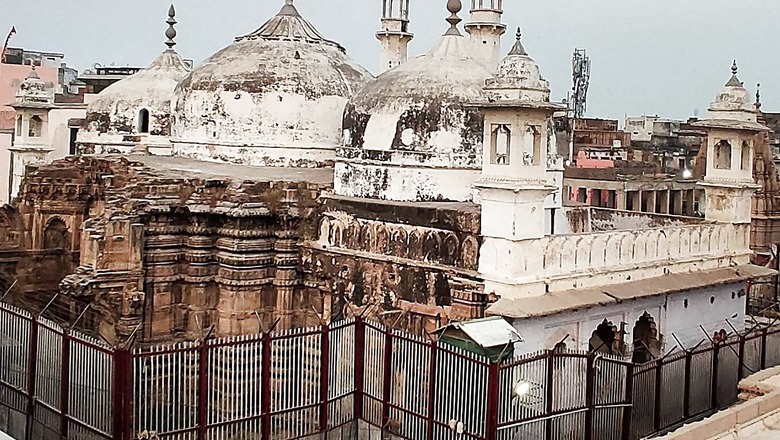
views
Earlier this week, the residents of Varanasi found themselves facing massive restrictions as they prepared to go about their daily lives. The state government had imposed Section 144, and tightened security everywhere. A local court was scheduled to announce its judgement in the controversial and highly awaited Gyanvapi case. The administration did not want to take any chances. Eventually, with some 250 police personnel guarding its premises, the court pronounced its decision, which went in favour of the Hindu side.
So what did the Hindu side win? Did they get the right to worship inside the Gyanvapi complex, as the five Hindu petitioners had requested? Not exactly. The court merely ruled that their suit was maintainable, and not subject to dismissal under the 1991 Places of Worship Act. In other words, the Hindu side did not win anything, just the right to present their arguments before the court.
So this is going to take a while. Separate court cases on whether to allow videography of the premises, whether to admit the videography as evidence, and so on. Each case may be judged and appealed at multiple levels, from the local court to the High Court, and most certainly the Supreme Court. Note that the remnants of the temple which was demolished to build the mosque are still clearly visible to all, and the case could be decided at a glance. But one has to trust the “system”. The first suit in the Ram Janmabhoomi case was filed in 1855. The case was finally decided in 2019. Because the state must be “secular”. And so, the Hindus must wait.
On the flip side, here is what also happened last week. The largely Hindu residents of Thiruchendurai village in Tiruchirapalli district of Tamil Nadu woke up to find that all their ancestral land now belonged to the Waqf Board. Not just some specks of land here and there, but the entire village. Because it now belongs to the Waqf, the villagers can no longer own nor sell their land. From now onwards, the land can only be used for Muslim religious purposes.
The homes and lands of some 7,000 mostly Hindu families. All gone. Along with a temple which is said to be 1,500 years old, and thus would predate Islam itself. How can this happen in a constitutional republic with rule of law, a country with legally recognized property rights? How can this happen in India, where land acquisition is always the biggest hurdle for any new project? Because in the secular state, all religions are equal, but some religions are more equal than others.
How Waqf Board can take away your land
Under Section 40 of the Waqf Board Act of 1995, the board can take away any property, anywhere in India, that the board has “reason to believe” might be Waqf property. First of all, what is a Waqf? Roughly speaking, it means a property that has been donated for Muslim religious charities. Unlike most property, it is inalienable, meaning that its ownership cannot be transferred or changed, including by the Waqf Board itself. This is how those unfortunate villagers in Tamil Nadu came to discover their plight. Someone tried to sell their land, which is when the local authorities informed them that they no longer owned it. The Waqf Board now owned it all.
Now here is where it gets really scary. Who decides whether a piece of land belongs to the Waqf? The Waqf Board does. Once they decide it is theirs, the ownership of the property is instantly transferred to them. They may or may not even inform you. Usually, the Waqf Board writes directly to the local authorities, informing them that some piece of land is now Waqf property. If you receive a notice, be aware that the land already belongs to them legally.
No, you are not entitled to compensation. On the other hand, you are now an encroacher, and the Waqf Board may impose financial penalties on you. In fact, the Waqf Board even has the power to impose penalties on civil servants for failing to prevent encroachment of whatever the board believes is Waqf property. From time to time, the Waqf board carries out surveys of the state to find out what land and property they might wish to take away. The cost of these surveys must be borne by the state government. That is the law.
Surely there must be some curbs on the sweeping powers of the Waqf Board, right? Well, before the Waqf Board takes away property, there has to be an “investigation”. Who will conduct this investigation? The Waqf Board itself. Could you appeal against their decision? Yes, but only before a tribunal of Islamic religious scholars constituted by the state government. Again, the law is clear that there is no right to appeal against the decision of this tribunal, even before a High Court.
In short, could the Waqf Board take away your land or your house tomorrow if they wanted? Yes, they probably could. And there is basically nothing you can do about it.
Legislation that took away rights of Hindus
In popular imagination, the story of Ram Janmabhoomi at Ayodhya is usually seen as a situation where the Hindu side prevailed. The mosque no longer stands there, and a grand Ram temple is scheduled to come up at the spot. For most common Hindus, it is a triumph of faith. For anti-Hindu elements around the world, it is proof of the rise of “fascism”.
But something is missing from this picture. In the period leading up to and the aftermath of the demolition of the mosque built over Ram Janmabhoomi, there was a wave of panic legislation that took away rights of Hindus. The first of these is the Places of Worship Act of 1991. The Act provided that the religious character of any place in India (with the possible exception of the mosque at Ram Janmabhoomi) cannot be changed from what it used to be on August 15, 1947. In other words, Hindus would not have any right to negotiate about their religious sites ever since the day Indians first got to have their own representative government. If the British left things a certain way, Hindus would have to accept that for the rest of time. How is that fair?
The Waqf Board Act of 1995 is in the same spirit, only even more outrageous. Let alone places of worship, the Waqf now received sweeping powers to seize the homes and lands of people anywhere in India.
Historical parallel with separate electorates
In 1916, the Indian National Congress and the Muslim League came together to present a joint proposal to the British for a form of self-government in India once World War 1 ended. One of the compromises reached between the Congress and the Muslim League was to provide for separate electorates for Hindus and Muslims. This came to be known as the Lucknow pact. Later, the British went back on the promises made to Indian leaders during the war. But separate legal statuses based on religion were here to stay.
How are the members of the Waqf Boards, which own over 7.5 lakh immovable properties across India selected? They have to be chosen from Muslim members of Parliament, state Assemblies and Bar Councils. There are other members too, nominated or selected in various ways, but they have to be Muslims. The separate electorate mentality haunts us even today.
An undeclared partition?
Compare the sweeping powers of the Waqf Board to the condition of the Hindu side which will likely still wait untold centuries for a real verdict in the Gyanvapi case. An obvious double standard emerges here. One group can just take whatever it wants at any time. Another group must file a case even to argue its case before a local court.
The detractors of modern India like to complain about something they call “undeclared Emergency”. But this looks more like an “undeclared partition.” Hindus and Muslims both living in India, but effectively under two separate legal systems. It is actually worse than that. While laws governing the majority community are made by the secular state, the minority community makes its own laws. This means that the minority religion is state-sponsored, while the majority religion is state-controlled.
The undeclared partition applies not just to our property rights and places of worship. It covers every aspect of our personal life: marriage, divorce, inheritance and even our bodily autonomy. And the system hurts those who are the most vulnerable among us. A recent Delhi High Court judgement, made according to religious law, ruled that a minor Muslim girl can “choose” to live with her “husband” if she wants. We are in the year 2022. India can certainly do better than this.
Abhishek Banerjee is an author and columnist. He tweets @AbhishBanerj. Akshita Bhadauria is a political commentator. She tweets @asingh_b. The views expressed in this article are those of the authors and do not represent the stand of this publication
Read all the Latest Opinion News and Breaking News here

















Comments
0 comment